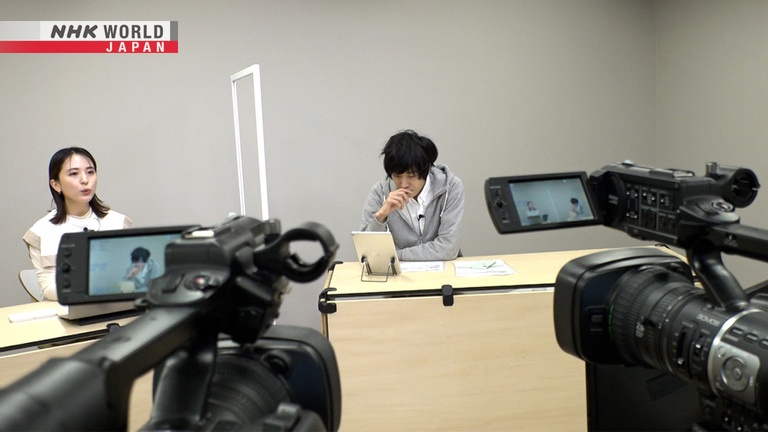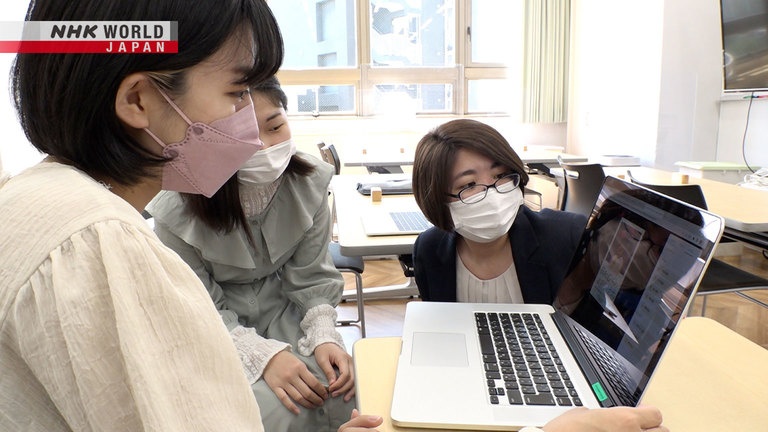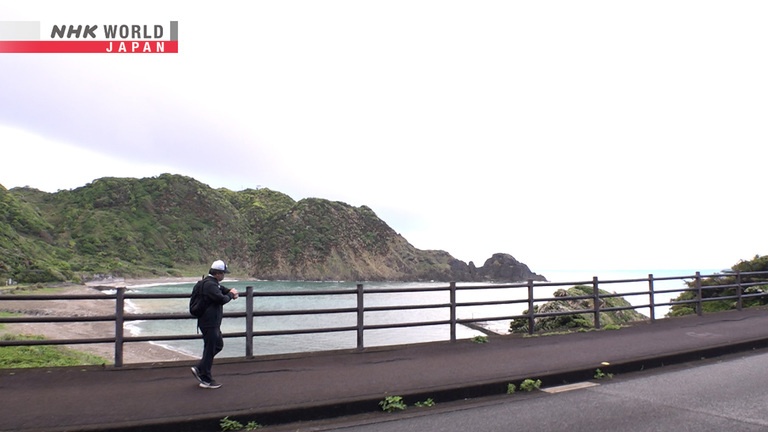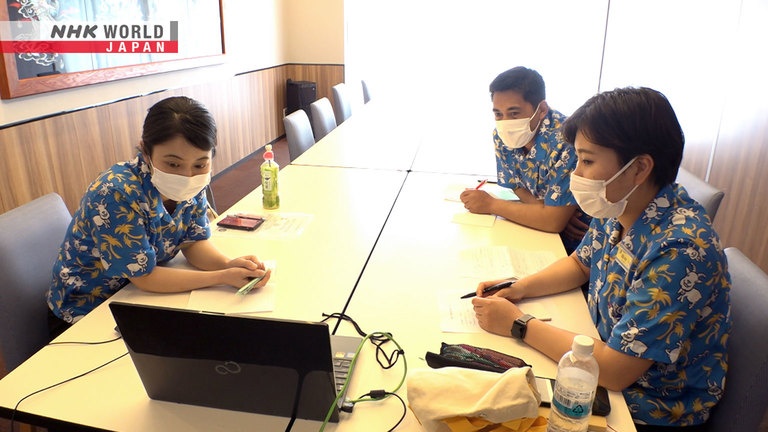Skills for the Post-Pandemic Job Market: E-Learning Innovator - Mori Kenshiro
Mori Kenshiro is the creator of an online learning platform that equips adults with the skills they need to navigate Japan's pandemic-hit job market. Along with free livestreamed evening classes, and an interface that lets users ask questions and chat with classmates in real time, a small monthly fee gives access to thousands of archived lectures. And as well as individuals and businesses, Mori's firm is working with depopulation-hit areas to prepare them for the digital economy of the future.




Transcript
"RISING"
"Skills for the Post-Pandemic Job Market" E-Learning Innovator - Mori Kenshiro
As the coronavirus pandemic runs into its third year,
Japan is facing a growing employment crisis.
Good morning, everybody.
This virtual seminar is part of a jobseeker support program.
The scheme provides free online training in key professional skills
required by office workers.
Launched in 2020 with support from the government,
to date the program has helped upskill some 100 people.
Working mother Hayakawa Kanna enrolled to address
her own work-related uncertainties caused by the pandemic.
Because of the pandemic,
I would have felt guilty about going out to an actual school.
Just like I feel kind of guilty about taking my son out for the day,
or even going shopping.
So I really have been grateful
for the chance to take these classes online.
We've seen a lot of people who were already in unstable employment.
And then their problems were further compounded when the pandemic hit.
It's been a common issue.
The program leverages a livestreamed learning platform
that's exploded in popularity during the pandemic.
Course options include training in essential office software
used by most businesses.
At the start of each lecture,
attendees announce their arrival in the session.
"I'm here!"
"Over to you, Tanaka-sensei."
"Thank you."
"I'll be talking about Excel,
from entering data, to various functions."
"I know many of you have felt frustrated
when using the cursor keys."
"Like you just can't do what you want to."
"I think lots of our learners will have felt like this
and probably you as well, Shiohara-san."
"Like, 'I just don't get it!'"
"It's t...tricky."
"I was starting to panic!"
Participants can also share their thoughts and comments in real time.
I'd never taken an online class before
but the comments in the sidebar
let you see what other students are thinking.
I thought it would just be a typical lecture,
you know, just sitting there, silently watching on your own.
But it was actually a lot of fun!
The company behind this livestreamed learning platform
is based in Tokyo's Shibuya district.
It was founded by Mori Kenshiro,
who also takes part as an instructor once a month.
The main difference between typical E-learning and our courses
is that with us you're not studying alone, but in a group.
Instead of putting learning materials online
it's like an actual online school.
It's a service that lets you enjoy the school experience.
Recent years have seen a boom in existing workers going back to school,
with particular growth in E-learning.
Against that backdrop,
Mori's firm launched its own livestreamed courses.
And, driven by the pandemic,
its user base has grown from 430 thousand in 2019
to some 750 thousand today,
including over 2,400 corporate contracts.
We sat in on a meeting about one of their most popular courses.
All drawn with just circles, triangles and squares.
Very basic.
Yes, simple.
Very simple to draw.
This course is on the skill of "graphic recording."
Using diagrams to capture the content of a presentation
is a great way for listeners to organize the key ideas
and deepen their understanding.
With online meetings now the norm due to the pandemic,
this has become a useful business skill.
The class gets underway.
"So, you take a basic stick figure,
and turn the body into a square."
"Then, when drawing the arms,
be sure they come out from the shoulders."
"Then put the legs on like this."
"And just like that, you can draw people really easily."
"There's just one, simple rule. Draw the arms from the shoulders."
This crash course in the basics is followed by an activity.
"Okay, everybody, now it's your turn!"
Students are asked to use the techniques they've been shown
to convey the relative status of team leader and members.
They post their contributions,
which are displayed to the rest of the class.
"Well, that's a funny one."
"A dominant leader!"
"I like how their relative size shows the power dynamic."
"You can feel the leader's authority."
"They're all facing the leader,
so you can see he's leading by example."
"And they're all admiring him."
"A leader you'd want to follow!"
"Nice! In a kind of conga line."
"Very clear and evocative."
"What a cute conga!"
"Everyone's drawings are so good!"
The actual content of the courses
should constantly evolve to suit the market or changing trends.
But the core concept that we mustn't change
is the idea of everybody learning together.
I believe that experience is the key
to help people follow through with their studies.
And of course,
I feel the development of that learning infrastructure
is also key to solving all sorts of issues we face as a society.
Mori first launched his service in 2011,
inspired by his experiences of E-learning platforms
during his first graduate position.
It was just so boring.
I was sure I could leverage the potential of the Internet
to create a more rounded learning experience.
And I realized that instead of just watching alone,
it would be more fun
if you could learn together while chatting with classmates.
Perhaps this service grew out of a desire
to remedy my own experiences of being motivated to learn
but coming away unsatisfied.
All their livestreamed classes are free to enroll,
with the current schedule focused on a daily after-eight-pm slot
that's convenient for those studying parallel to existing jobs.
Providing livestreamed classes free of charge
has been the core concept ever since we started.
There are all sorts of barriers to starting, or continuing,
with learning a new skill,
so we strive to eliminate those.
The key thing is making sure that
anyone can study whenever they want to.
It's important to be able to study what you want
without being held back by things like course fees or scheduling.
There's also an online archive of almost 8,000 past lectures.
For a monthly fee of just 980 yen,
users attracted by the free livestreamed classes
get unrestricted access to all archived content.
Topics address the changing realities of the workplace,
from practical office computing skills, to design,
and even interpersonal relationships.
In Yamaguchi Prefecture, western Japan,
we meet one user who has benefitted from Mori's service.
Having given up her job in hotel guest services to focus on parenting,
Urayama Arisa is now looking to get back into work.
Of course, hotels are suffering due to the pandemic.
So I wasn't sure there'd be any openings for me in my old line of work.
That was a worry.
And I wondered what kind of work I could do parallel to parenting.
She signed up with Mori's service,
for courses on "design" and "branding."
"I'd like to take you through the basics of design
that instantly gets your point across."
"So, it's all about instant impressions?"
"They have to be eye-catching."
As the course went on, I realized this was something I could do.
All I had to do was give it a try.
Urayama took what she'd learned
and began posting regularly on Instagram.
I already had an account,
but all I used to do was just post things I'd bought.
I went from that to saying what was good about them,
what benefits they brought, communicating my own thoughts.
It's just a small shift, but I realized it was OK to express myself.
Her new design insights were leveraged
through tasteful deployment of captions and props.
The result was a tenfold increase in followers,
and now she even fields requests for promotional posts.
It's helped me believe that the perfect vocation for me is out there.
My confidence still isn't up to 100% yet,
but it's higher than last year.
A big motivating factor for Urayama
is the classmates studying alongside her.
A group who met through the online classes
gather for an in-person meeting.
All of them went back to school in search of new skills
to drive their careers forward.
I had tried studying by myself before.
I bought books,
but I couldn't settle down to study with my son crying and so on.
I thought I wasn't cut out for studying and I gave up,
but these courses pull you along organically.
And I think a big part of that is your classmates.
I never realized how fun it could be to study together with others.
And it naturally gives you, now, what's the word?
"Agency," perhaps.
This service lets you take charge of your own studies.
One member is even getting ready to launch his own business.
Instead of just passively listening,
you get to proffer your own opinions,
as well as getting outside perspectives.
All that helps you learn.
And the importance of lifelong learning
even among the steadily employed is becoming ever more apparent.
Until recently, you'd go to college once,
devote a set amount of time and money to studying,
then use what you'd learned at work until you took early retirement,
and that was seen as the fruit of your learning.
That one period of study was always enough for you to get ahead in life.
But societal shifts mean nowadays you have to keep learning
just to be able to keep up.
Lifelong learning in tune with changing times is so important,
and as a society we need to create those opportunities.
Mori's learning platform is also finding uses in higher education.
This design school is trialing lessons
using the same livestreamed format.
For our online participants, you can turn your mics on now.
In this session,
participants share imaginary film posters they've designed,
for the rest of the group to discuss.
Nice. Catchy slogan, too!
I didn't give much thought to the slogan.
Really?!
And as well as audio discussion,
students can leave comments in the sidebar.
There are even buttons labeled "got it" and "umm..."
to let participants easily share their level of comprehension.
There's even an in-platform multiple choice quiz.
So what do the students think of this format?
There are all sorts of features
that you don't get in a typical in-person lecture.
I think it's great that they're providing a platform like this
to help get the most out of your studies.
The use of Mori's system in colleges like this one
gives everyone the opportunity to take specialist courses,
regardless of location.
Japan's low birthrate and aging population mean that
to stay afloat colleges
will have to take more working adults seeking to reskill.
Say there's this great design course you wanted to take
at a college over in Ishikawa.
If that means quitting your job
and spending two years as a full-time student,
it's not so realistic.
But we're working to leverage our knowhow and learning platform
in order to overcome those kinds of hurdles.
Amami Oshima is an island off the coast of Kagoshima
in Japan's southwest.
Known for "Oshima tsumugi" textiles,
dyed with a traditional technique using mud,
the island's rich nature and high biodiversity
have seen it designated a UNESCO world heritage site.
But the last 30 years have seen population fall by almost a third,
while the proportion of residents aged over 65
has more than doubled to an ominous 35%.
But last year,
the local authorities sealed an arrangement with Mori's firm
that currently has some 60 thousand islanders
able to take advantage of free livestreamed classes and archive videos.
Good morning.
Yamasaki Kazuyoshi is vice principal
of a combined elementary and middle school in Amami Oshima.
Each morning,
he listens to content from Mori's platform on the way to work.
Lovely view.
And there are no houses along here,
so I gave up on earphones and now I just listen without.
Today's theme is Montessori education.
A key feature of Montessori education
is integrating learning with nature.
You have to keep learning in order to make progress.
Ashikebu Elementary and Middle School
has only 48 students spread across nine grades.
With the island's school-age population also falling,
the school is working to attract children
from outside its traditional catchment area
through the promise of lessons in harmony with nature.
I also believe that in this line of work
you have to be constantly learning.
If we want the children to learn,
then we ourselves must constantly be open to learning.
Meanwhile, at a community center in the heart of the island...
We join a seminar for young workers
from local authorities and businesses.
They're here for a joint training initiative,
set up by the local government, based around Mori's service.
With some 90% of high-school graduates choosing to leave the island,
there's a strong need to foster and retain young local talent.
Kawatari Chihiro left the island after graduation for work in Tokyo,
but returned here late last year.
I worked in Tokyo in the food services sector for five years,
but at the end of last year I came back here
and found my present position.
She's currently employed at a local hotel
with over half a century of history.
And two other colleagues are also enrolled in the training initiative.
We join them as they watch a seminar that teaches fun
and effective communication skills.
The hotel's assistant manager has high hopes for the scheme.
It's been quite a while
since we've had a crop of dynamic young members like this
join our staff.
We've always had our own approach to training,
but to be honest it was getting a bit stale.
A bit too stiff and conservative, perhaps.
We wanted to try and change that mentality.
At the end of the program, what did Kawatari think?
It was so much fun.
It was only four days but I feel like I learned a lot!
And Mori's service is also in use at this local vocational college.
With no university on the island,
this is the one place to learn IT skills.
We speak to one of the students.
I was doing a physiotherapy course on the mainland,
but I dropped out and came back home.
Then, just as I felt I was ready to have another try
at starting a career,
I found out about this college, so I signed up.
The school's recruitment poster reads,
"Why not give learning another go?"
We do have students in their 20s and 30s who started a career
but then decided to reset and try something new.
In the past, we've even had people signing up in their 50s and 60s.
So what benefits does Mori's service bring to this college
and its diverse student body?
After I've given a class, I set videos to watch on the same topic.
That way they get another chance
to hear terms they may not have understood in my lesson,
and I think that kind of repeated exposure helps to solidify retention.
That's my aim.
And as well as revision,
the service is also serving to broaden students' learning.
During the summer holiday
I watched five or six videos from the archive, on design.
About things like user-friendly website layout,
and about how a user's attention moves around the screen.
It was really interesting.
Of course Amami Oshima is an island,
so not many technical experts and so on come here from the mainland.
But this online platform
lets you learn from the people on the cutting edge in Tokyo,
and pick up valuable insights on their jargon, knowhow,
and the latest technologies,
I think that's fantastic.
And what do local officials think about Mori's service?
On a remote island like ours,
of course there's limited prospect for manufacturing
and other such industries to take hold and grow.
But the digital sector is such a fertile area for employment,
especially for younger people,
and we hope that by strengthening in that area
it can be a prosperous sector for our locale.
The goal is to leverage this online platform
to equip local people with the digital knowhow and earning potential
that can revitalize the community as a whole.
Most regional locations don't have the structure in place
to facilitate life-long learning for people
after they enter the workforce,
and that's also one of the reasons
they've been unable to tackle the issue of aging populations.
But now I think,
more and more local governments are seeking to address that.
And some locals are already putting digital skills acquired
through Mori's service into action in their work.
Ten years ago, Kato Miho and her family moved to the island
from the greater Tokyo area.
She currently works in PR for the town of Tatsugo,
but there was one particular skill that she'd long been keen to learn.
There's an annual contest in which local government employees compete
to make the best promo film.
Every year, our PR section is in charge of making the video for Tatsugo,
but I've always had to hire somebody to make it for us.
I thought how much less stressful the submission process would be
if I could edit our submission by myself.
Kato took a course from Mori's service.
This is it, a lesson on professional video editing software.
"I hope this class can help all sorts of people
with no experience editing videos
but feel they'd like to try it for themselves."
"Can you switch between color and black and white?"
"You can achieve a monochrome effect
by dragging and dropping onto your clip
from the effect section on the left."
"Let's make this monochrome."
"See? Our clip is now in black and white."
After two months of studying, Kato was able to create her own video.
I was just so happy.
It felt like such an achievement.
In the end my video didn't win the prize
and some things didn't quite work out as I'd hoped.
But it felt fantastic to make my ideas a reality.
We also visit a video production company in downtown Amami.
Here, they make local promotional content and ads.
President Kimura Mariko moved to the island seven years ago
from Fukuoka Prefecture.
She took advantage of Mori's courses to brush up her skills
for building websites and creating posters.
In all honesty, if you want to make more money,
cities are the place to be.
But if your focus is all-round quality of life,
then Amami Oshima has so much going for it.
The courses they offer provide one way
to help balance those two factors.
It's about working out what you can do now
to improve your earning potential in the long term.
And one year into the partnership with Amami Oshima,
Mori Kenshiro remains committed to helping the island
tackle its employment issues.
I want to create a platform that provides people with as much choice
and as many opportunities as they want.
And that lets our users resolve challenges in their own lives,
for their organization or company, and for society as a whole.
That's the world we want to create.